News
Wildlife authorities keep their hands off privately-held animals!!
View(s):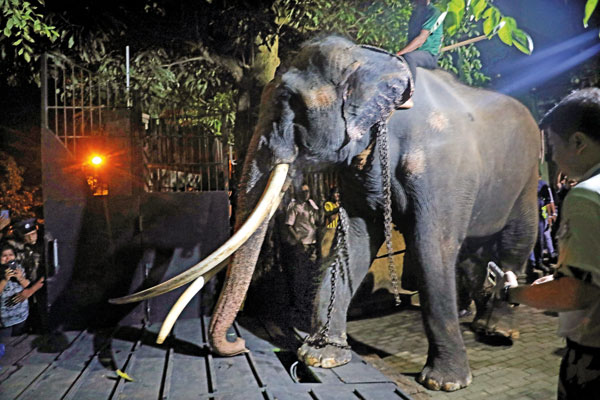
Muthu Raja's Thailand-bound trip began around midnight last Saturday from the Dehiwala zoo. Pix by M.A. Pushpa Kumara and Akila Jayawardena
By Kasun Warakapitiya
Currently the animal is undergoing a 30-day quarantine period in Thailand, but the controversy over the events leading to its repatriation continues.
The controversy shifted to another elephant, Thai Raja, donated by Thailand and now in the custody of the Dalada Maligawa with claims that the elephant will be requested by the Thai Government.
Veterinarian and a professor at Peradeniya University faculty of veterinary medicine and animal science, Ashoka Dangolla told the Sunday Times that he had highlighted the need of specialised hospitals for treating captive elephants for over 20 years. There is no infrastructure, equipment, or a hospital dedicated for elephants, he said.
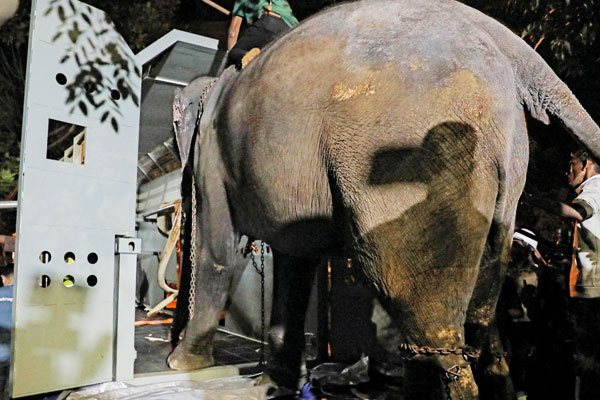
He said it would be greatly helpful if Sri Lanka gets an x-ray machine for elephants.
“I met the Thai Ambassador this week when he visited Thai Raja at Suduhumpola Rajamaha Vihara, Kandy. I explained to the Thai delegates the condition of the tusker. The ambassador also emphasised that Sri Lanka does not have the infrastructure to treat elephants,’’ he said.
Prof Dangolla said the Thai ambassador assured that the Thai Government has not decided to ask back gifted tuskers Thai Raja and Kandula.
Thai Ambassador Poj Harnpol who observed the Thai Raja tusker said that he does not see any problem with it and added that the positive that came out of Muthu Raja being transferred to Thailand was of greater awareness of rearing and caring of the animals.
Meanwhile, environmental groups said that even though the tusker was in Sri Lanka for over 20 years, none of the Governmental organisations proactively took initiatives to improve the living conditions of the tusker.

However, both the Department of Wildlife Conservation and the zoo claimed that they did not have purview of the privately owned animal.
DWC director general Chandana a Sooriybandara said that they do not have legality to take action although an animal rights group repeatedly sent letters asking the DWC to take action while not taking legal actions against them for inaction or trying to complain to the relevant parties empowered to take action.
Foreign wild animals which are held captive and gifted, therefore do not come under the preview of the Wildlife Department as they only deal with native animals, he said.
Meanwhile, the Director General of the Zoological Gardens, Thilak Premakantha told the Sunday Times that Muthu Raja was not registered under the zoo, therefore they, too, did not have authority to treat privately-owned Muthu Raja. 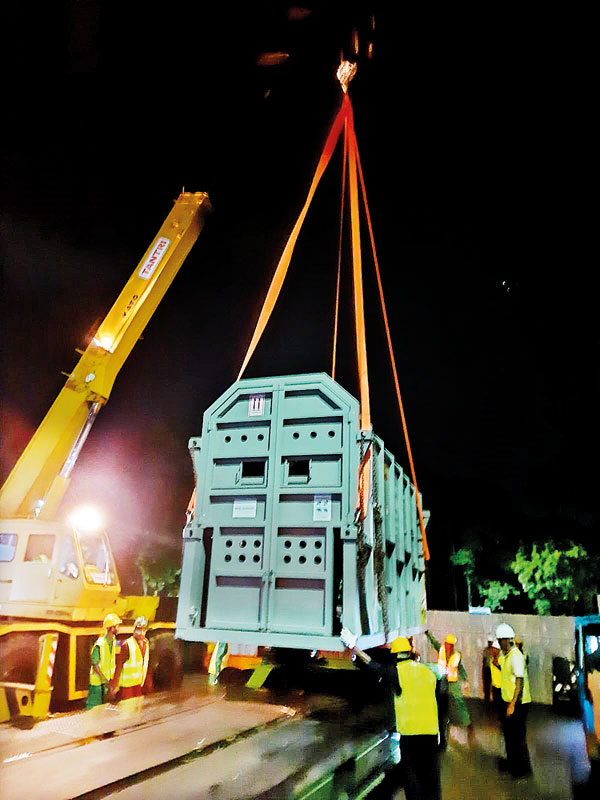
“According to the National Zoological Gardens Act we cannot treat privately-owned animals, but if the chief incumbent of the temple requested us to do so we would have been able to provide medical care,” he said.
He emphasised the need of the Animal Welfare Bill as it could be used to enforce action against the persons who cruelly treat animals.
Lawyer and animal welfare advocate, Lalani Perera who is petitioning for the Bill said it was recommended by Sri Lanka’s Law Commission in 2006 to replace the antiquated Prevention of Cruelty to Animals Ordinance of 1907.
Although a Government-appointed steering committee strongly recommended the enactment of the Bill, it has taken nearly two decades for its presentation in Parliament in February 2022.
It has remained on the order paper for over one year. This compelled the petitioner representatives to appear before the parliamentary consultative committee on agriculture, under whose purview the Bill now falls and explain its need in full.
She said that at present there are no regulations to protect elephants in the custody of private persons. Regulations for this purpose were proposed by the Animal Welfare Trust (AWT). During the time Gamini Jayawickreme Perera was the wildlife minister, the regulations proposed by the AWT were approved by the Cabinet, but action to bring them into force was thwarted by private elephant owners. They continued to do so during the terms of two other wildlife ministers.
However, when “Wimalaweera Dissanayaka, held office as the state minister of wildlife, published the regulations, omitting many sections that were unfavourable to private ‘owners’, and adding new sections beneficial to such ‘owners’. These regulations have been challenged and are now before court, awaiting determination,” she said.

Thilak Premakantha
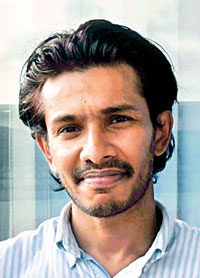
Milinda Kodagoda
Meanwhile, sources from the DWC said that the actions of the “owners” wasted opportunity to set up regulations and set conditions to look into when the elephants are registered and permits are given.
The director of RARE Sri Lanka, Panchali Panapitiya said that the Department of Wildlife Conservation, and the Department of National Zoological Gardens were giving excuses such as the animal was not under their preview as well as not registered under them to take action. “Why can’t the wildlife, the department of the zoo discuss with relevant authorities and take action, why do they always call us to take the initiative to go to courts or lodge complaints with the police, why should we, they are Government authorities,’’ she said.
She admitted that they did not lodge police complaints but took the initiative to contact the Thailand Government as none of the Government institutions took action to save Muthu Raja.
Environmental lawyer Jagath Gunawardena said there is no law to look into animal welfare in Sri Lanka.
Animal rights activists have been urging the Government to pass an animal welfare bill for over two decades. He said the police are empowered to take action under the Prevention of Cruelty to Animals Ordinance.
“However, police have not taken action against the animal abusers in the case of Muthu Raja,’’ he said.
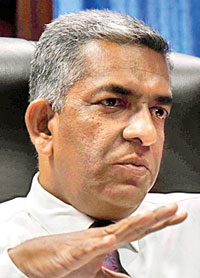
Chandana Sooriyabandara
He said exotic animals are not covered under the provisions of the Fauna and Flora Protection ordinance, therefore the DWC does not have purview over taking action on cruelty to Muthu Raja.
Sri Lanka is getting a bad name by ill-treating elephants in captivity, therefore all the relevant authorities should get together and prepare a plan to take care of them, including those gifted by other countries.
The police media spokesman, Nihal Thalduwa told the Sunday Times that he has to study the force’s legal position as well as that of the wildlife to comment.
The research and development engineer who designed the crate for the tusker, Milinda Kodagoda said that there are capable people who could design a hydrotherapy unit, scale to measure weight of elephants if specifications are given.
If the Government is short of funds it can even call for sponsorships from the private sector and ensure the health of animals.
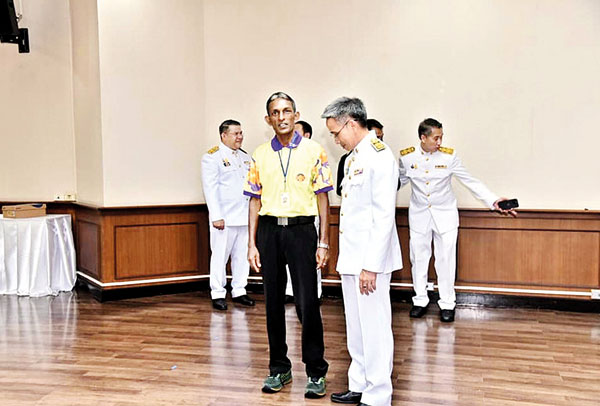
Thailand: Don Upul Jayarathna Denelpitiyage, the mahout from the Dehiwela zoo in Sri Lanka arrives at the Ministry of Natural Resources Environment on Friday to attend a ceremony to receive a gift from Their Majesties the King and Queen for taking care of the ailing Thai elephant Sak Surin. (Photo: Thai Ministry of Natural Resources and Environment)
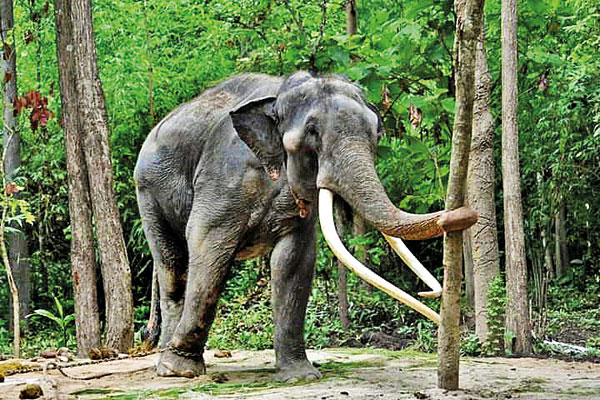
Sak Surin at the Thai Elephant Conservation Centre in Lampang after returning to Thailand last week
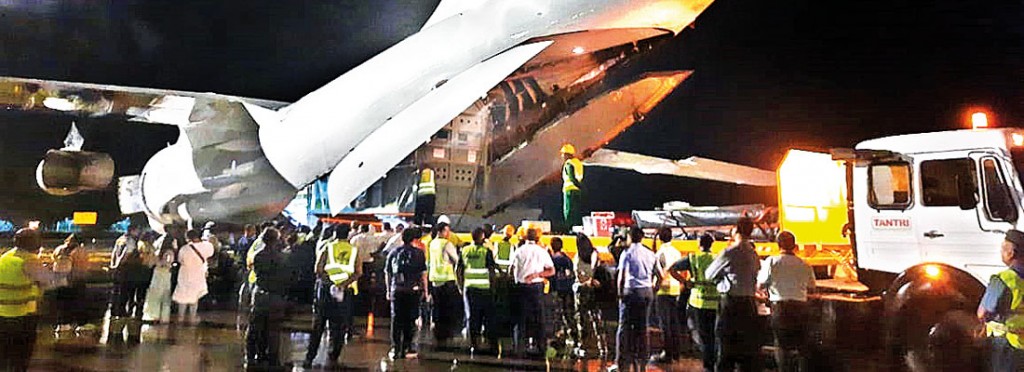
At BIA: The crate carrying Muthu Raja was hoisted by a crane before being loaded onto the cargo hall of the flight
| DWC says Muthu Raja was not its responsibilityMuthu Raja (Sak Surin), was under the ownership of Kande Viharaya in Aluthgama, the director general of the Department of Wildlife Conservation (DWC) Chandana Sooriyabandara said yesterday. “Even though the animal was registered and provided with permits under the DWC, the animal did not come under its preview. It is not there in the Fauna and Flora Protection Ordinance that we should ensure animal welfare of privately owned animals,” he said. He said the mandate is to manage and conserve wildlife and maintain ecological balance according to the ordinance. “Legally we don’t have a preview, but if the animal rights organisations wanted us to take actions they could have filed a case against us and get the court to issue a ruling that says we should look into the welfare of the animal. They knew that if the court ordered us we would act, but instead they advocated for Thailand to intervene,’’ he said. Mr Sooriyabandara said Muthu Raja does not not come under the preview of the department, which conserves native animals. It is a captive animal from Thailand. “There are around 13 elephants gifted by foreign countries and are already registered and permits issued under them as the owners have CITES import permits,’’ he said. Registration is done to maintain a list of animals and their owner’s details as well as places at which the animals are held, he said. Muthu Raja had been registered and its license renewed until 2013, as a slew of court cases were filed against illegally held, captive elephants the registration was temporarily halted according to a court decision, as the cases are ongoing, he said. A person or party owning an elephant, with permits and registration, are responsible for the animal’s well-being.
| |
| Bitter lessons from the neglect of Muthu RajaExpressing concern over the welfare of Muthu Raja (named Sak Surin in his home country) with its crossed tusks, international zoologist and animal upkeep expert Vasantha Nugegoda said that hopefully this “sad incident” would not be politicised by the Thai authorities.Recommending that a companion should be found for him to help speed up his recovery and facilitate the passing on of his genes, he said that ideally, the tusker should not have been relocated as he was ill but instead isolated at an appropriate location near the temple where he has practically lived all his life and been treated by professionally qualified animal experts. Mr. Nugegoda, explaining that as Muthu Raja’s wounds healed due to treatment by veterinary surgeons of the Dehiwala Zoological Gardens, at least one vet and two caretakers from the Zoo should have accompanied the animal. Such a vet should be with the animal for at least two months and the caretakers for one year. Mr. Nugegoda said that as Muthu Raja is now used to Sri Lankan mahouts and their language, it was important for him to be with those speaking this language. There are strict protocols across the world even when animals are moved from one zoo to another. When countries request donations from China, it only loans them to that country and they are sent with a vet and a keeper from China until the receiver-zoo staff is trained to look after these animals. “The non-governmental organizations (NGOs) which lobbied on behalf of Muthu Raja in Sri Lanka should keep track of what is happening to him in Thailand,” he suggested. Preparation helped ease logistics challenges The research and development engineer who designed the crate used to transport Muthu Raja (Sak Surin), Milinda Kodagoda said he was asked to plan the transport to the Bandaranaike International Airport and the loading. The crate was moved to the Dehiwala zoo around June 13, so the tusker could be trained to stay in it. Gradually, the guard rails and padding were added. The first trial run was done without the tusker in the early hours on June 28, to simulate the time frame. The repatriation began on Saturday July 1, with the loading of the tusker into the crate on a gooseneck trailer. He said a gooseneck trailer was used to transport the crate from the Dehiwala zoo to the Bandaranaike airport’s cargo village.The trailer can be lowered for easy access to the crate. The trailer left the zoo to the airport via the expressway escorted by police and vehicles of the Thai veterinary team and zoo veterinarians. Thai veterinary officials also monitored the tusker’s movements live by CCTV in the crate. At the airport’s cargo village the crate was hoisted by a crane and moved to a triaxle flatbed trailer for loading onto the cargo hall of the flight. The tusker was loaded onto the Russian charter flight IL-76 which left for Thailand around 7:45 am last Sunday. |
The best way to say that you found the home of your dreams is by finding it on Hitad.lk. We have listings for apartments for sale or rent in Sri Lanka, no matter what locale you're looking for! Whether you live in Colombo, Galle, Kandy, Matara, Jaffna and more - we've got them all!

